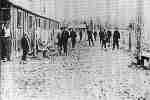
|
Detainees in the Vernon internment camp, British Columbia 1916 (Photo courtesy of the US National Archives) |
Two days ago, Katerina Grys returned home to Ternopol in western Ukraine. Here for a month, she went back full of praise for Canada. "It's the best country in the world," she enthused. "Hardworking people can achieve everything they want."
Katerina was visiting her brother, Jack, who had left the Soviet Union 49 years ago, after his homeland had been annexed by Stalin. Just 17 when Hitler's forces invaded in 1941, he went to Germany because of rumors about jobs there.
Jack and hundreds of other young Ukrainians quickly realized how wrong they were. Meanwhile, in occupied France, a young Russian Orthodox priest was permitted by the Nazis to minister to other Ukrainian expatriates. "They didn't want to spend money on these young people at all," I was told by the priest, who today is Archbishop Sylvester of the Russian Orthodox Church in Montreal. "They were living in barracks all year round and not too many of them could endure working 16-to-17 hours a day and they fed them only bare rations."
Jack survived and when the United States Army rolled into Germany in 1945, he began working for them. Four years later, his supervisor offered him a chance to emigrate to the U.S., but Jack declined. "I better go to Canada," he replied. "It is a country of farmers and many of our people have already found a good life there."
Unlike many Ukrainians, he never worked as a farmer after arriving here in 1951. For 35 years, until his retirement in 1989, he was a bus driver in Renfrew while, back in Ukraine, the demanding Soviets depleted what was once the bread-basket of central Europe.
Historically, Ukraine was almost always under some other country's control and peasants suffered most. The dream of having their own piece of land was carried down through the generations. It's probably in their genes.
In the 17th century, for example, the Russian empire began a massive exploration of Siberia. To attract settlers, the Czarist government promised free land east of the Ural mountains that separate Europe from Asia.
A significant number of newcomers to Siberia were from Ukraine. However, that experiment was ended in the late 1800s, so land-hungry Ukrainian homesteaders began looking to Canada. There were almost 200,000 of them here by the beginning of World War I. Half of them were from western Ukraine, which was part of the Hapsburg Empire and so they carried Austro-Hungarian passports. They were perceived by the Canadian government as a potential threat in much the same way as Japanese Canadians were on the west coast during World War II.
Despite the fact that some 60% were naturalized Canadians, 5,000 were interned in 26 camps and 88,000 others had registered as "enemy aliens." Like the Japanese nearly 30 years later, they were deprived of their basic rights and their property was confiscated and never returned. The War Time Elections Act of 1917 disenfranchised them so they had no democratic way of protesting, and they were kept in the camps for two years after the war. Some were even deported as "dangerous foreigners" and "radical aliens."
All of this was despite the fact that Britain had advised Ottawa that Ukrainians should be treated as "friendly aliens" because of their hostility to the Austro-Hungarian empire. For reasons that remain unclear today - government files having been destroyed in the 1950s - Ottawa ignored that advice and persecuted innocent people.
Canadian Ukrainians today are not looking for apologies. Rather, they want a simple acknowledgement of the wrongs done to their parents and grandparents, some compensation for the handful of survivors, a community fund and placement of historical markers at the former campsites across the country. Perhaps more important for all ethnic groups, they also want legislation that would prevent this from happening again.
Today, Katerina Grys is back with her family. She will remember Canada for as long as she lives, not just because stores were full of consumer goods but also because of our clean environment which many of us take for granted. Unfortunately, two million children in Ternopol and elsewhere in Ukraine are not so lucky. Victims of one of the worst environmental disasters in modern history - Chernobyl - they suffer from leukemia and other diseases resulting from exposure to radiation.
Instead of symbolic redress at home, Canada could make a more meaningful contribution to the health care of these children.
Royz is editor of the Russian-language Nasha Gazeta.
![]() Return to Righting An Injustice Page
Return to Righting An Injustice Page
![]() Return to Internment of Ukrainians in Canada 1914-1920 Page
Return to Internment of Ukrainians in Canada 1914-1920 Page
![]() Return to Ukrainian History Page
Return to Ukrainian History Page
![]() Return to InfoUkes Home Page
Return to InfoUkes Home Page
Document URL: http://www.infoukes.com/history/internment/booklet02/doc-051.html
Copyright © 1994 Ukrainian Canadian Civil Liberties Association
Copyright © 1994 Lubomyr Luciuk
We acknowledge the help in the preparation of this document by Amanda Anderson
Page layout, design, integration, and maintenance by G.W. Kokodyniak and V. Pawlowsky
Copyright © 1996-1997 InfoUkes Inc.
E-mail: internment@infoukes.com
|
since Mar 1 1997 |
InfoUkes Inc. Suite 185, 3044 Bloor Street West Etobicoke, Ontario, Canada M8X 2Y8 Tel: (416) 236-4865 Fax: (416) 766-5704 |
Originally Composed: Tuesday December 3rd 1996.
Date last modified: Thursday October 30th 1997.